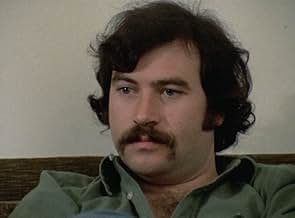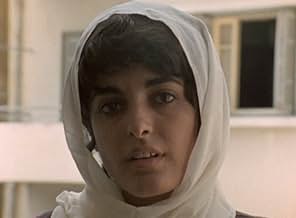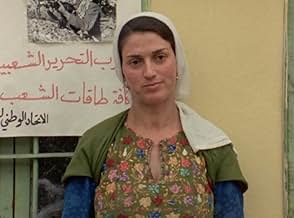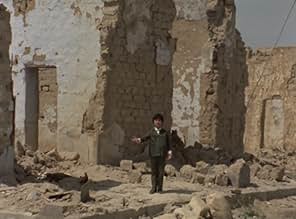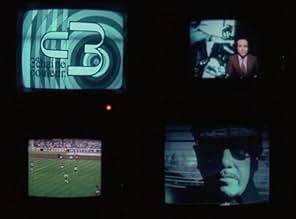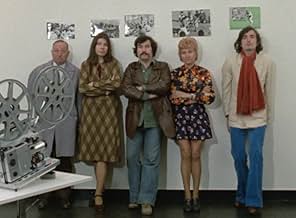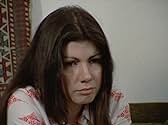Agrega una trama en tu idiomaThe movie incorporates footage of fedayeens taken for an aborted pro-Palestinian film which had been abandoned when subjects were killed. Here and Elsewhere takes its name from the footage i... Leer todoThe movie incorporates footage of fedayeens taken for an aborted pro-Palestinian film which had been abandoned when subjects were killed. Here and Elsewhere takes its name from the footage it shows of the fedayeens and of a French family.The movie incorporates footage of fedayeens taken for an aborted pro-Palestinian film which had been abandoned when subjects were killed. Here and Elsewhere takes its name from the footage it shows of the fedayeens and of a French family.
- Dirección
- Guionistas
- Elenco
Jean-Luc Godard
- Narrator
- (sin créditos)
Anne-Marie Miéville
- Narrator
- (sin créditos)
- Dirección
- Guionistas
- Todo el elenco y el equipo
- Producción, taquilla y más en IMDbPro
Opiniones destacadas
A dialectic is established here across time and space. "Here", in 1974 present time, a Parisian bourgeois family is watching TV in their cosy livingroom. "Elsewhere", in 1970, Godard and his Dziga Vertov company is in Palestine making a documentary about a strife that goes back in centuries and is expected to blossom into a revolution. I won't say I'm glad the documentary was never completed, but I'm glad that what started as political rhetoric four years later was allowed to be reflected upon in the aftermath of that political rhetoric, what it addresses and what it fails to, and how the artistic voice is shaped in that gap.
I will preface this by saying that I admire in Godard not the sentiment to formulate the political rhetoric, but the conviction to formulate it in harm's way. It's one thing to play out a little reenactment of a revolution in the safety of the Parisian countryside, as he did in Week End, and it's a different thing altogether to leave behind your life and film in Fatah's stomping grounds. All this coming from the same filmmaker who years earlier was in position to make a film with Brigitte Bardot and Jack Palance. I applaud the breach and the reclusiveness. When Godard said "fin du cinema", he was only talking for himself, but he meant it, at least at the time.
I know Herzog can't stand Godard, but a film like this reminds me of him. How he took a camera across the world to make small essayist pieces that would never be exposed to a big audience, the sense of adventure and exploration and the openness to the possibilities of making a film that "catches life unawares". Herzog probed the universe and the human soul, sought truth above and below reality, in the ecstacy that liberates from it. Godard is an intellectual, I see in him a filmmaker sadly anguished inside his own head. His folly, indeed the folly of the intellectual, is that he needs a cause to be passionate about. If inspiration doesn't come from the heart he will seek it in the outwards. Godard found it in the revolution. What fascinates me with Godard then is watching him struggle to break free from the confines of his head. I see a lot of conceit in his expression, but I am intrigued by the struggle to express it. With, and often without, regard to expectations, his own and those of others.
The beauty of Ici et Ailleurs for me is that Godard self-examinates. Another reviewer aptly put it that "no one questions the political image like Godard". Here, he plays tricks with the image and the word, he connects the Middle East struggle back to France, to Hitler, to the October Revolution of 1917. But what is more apt for me, what I appreciate here, is that Godard begins to question the political image of Godard, by extention the concept or conceit of "cinema verite".
Near the end, as we see on screen a group of Palestinian guerillas huddling together to devise strategy, all of whom would be dead in a few months (we see their dead bodies), Godard ruefully laments they didn't say anything. The female narrator interrupts and says "you, you could have said something".
This doesn't so much question the person, because whay could Godard have said to sway a band of armed guerillas, but the art. Dziga Vertov imagined a cinema that "caught life unawares" in the hope that, through the artifice of a cinema narrative, a truth could be surmised. What happens though when in the pursuit of that "kino-pravda" (cine-truth) we only observe but don't participate? Does the filmed image carry moral complications and is the camera complicit in what it sees? Food for thought.
I will preface this by saying that I admire in Godard not the sentiment to formulate the political rhetoric, but the conviction to formulate it in harm's way. It's one thing to play out a little reenactment of a revolution in the safety of the Parisian countryside, as he did in Week End, and it's a different thing altogether to leave behind your life and film in Fatah's stomping grounds. All this coming from the same filmmaker who years earlier was in position to make a film with Brigitte Bardot and Jack Palance. I applaud the breach and the reclusiveness. When Godard said "fin du cinema", he was only talking for himself, but he meant it, at least at the time.
I know Herzog can't stand Godard, but a film like this reminds me of him. How he took a camera across the world to make small essayist pieces that would never be exposed to a big audience, the sense of adventure and exploration and the openness to the possibilities of making a film that "catches life unawares". Herzog probed the universe and the human soul, sought truth above and below reality, in the ecstacy that liberates from it. Godard is an intellectual, I see in him a filmmaker sadly anguished inside his own head. His folly, indeed the folly of the intellectual, is that he needs a cause to be passionate about. If inspiration doesn't come from the heart he will seek it in the outwards. Godard found it in the revolution. What fascinates me with Godard then is watching him struggle to break free from the confines of his head. I see a lot of conceit in his expression, but I am intrigued by the struggle to express it. With, and often without, regard to expectations, his own and those of others.
The beauty of Ici et Ailleurs for me is that Godard self-examinates. Another reviewer aptly put it that "no one questions the political image like Godard". Here, he plays tricks with the image and the word, he connects the Middle East struggle back to France, to Hitler, to the October Revolution of 1917. But what is more apt for me, what I appreciate here, is that Godard begins to question the political image of Godard, by extention the concept or conceit of "cinema verite".
Near the end, as we see on screen a group of Palestinian guerillas huddling together to devise strategy, all of whom would be dead in a few months (we see their dead bodies), Godard ruefully laments they didn't say anything. The female narrator interrupts and says "you, you could have said something".
This doesn't so much question the person, because whay could Godard have said to sway a band of armed guerillas, but the art. Dziga Vertov imagined a cinema that "caught life unawares" in the hope that, through the artifice of a cinema narrative, a truth could be surmised. What happens though when in the pursuit of that "kino-pravda" (cine-truth) we only observe but don't participate? Does the filmed image carry moral complications and is the camera complicit in what it sees? Food for thought.
...with the possible exception of Godard's masterly "Marxist
Western" WIND FROM THE EAST. Godard's onetime crony Jean-Pierre Gorin shot some 16mm footage of Palestinian
resistance fighters in 1970; shortly thereafter, almost all the
people Gorin recorded were dead. Godard's film--with some
pungent, questioning commentary by Anne-Marie Mieville--uses
the footage to ask questions about "the representation of the
other": the interesting part is that Godard includes "the politically
sympathetic representation of the other" into his mix. Just when
you start noticing that Gorin's images of cute Palestinian children
doing commando exercises smacks of the Riefenstahlian, Mieville
comes along to point that out more succinctly and poetically than
you ever could. As poetic and eggheadily insular as Godard's
dialectic is, he interrogates the political image more thoroughly
than anyone else in movies. He does it by way of a close reading
that will only fail to exasperate those used to old-school
deconstructors: Godard mines a tremendous amount of insight
through a searching examination of his own use of the word "and"!
In an age when our experience of World War Three is massively
mediated by MSNBC and Fox News (and, as Godard points out,
their images, not just their Limbaughian play-by-play), ICI ET
AILLEURS is a needed deprogramming device. For God's sake,
find some obscure video store and rent it.
Western" WIND FROM THE EAST. Godard's onetime crony Jean-Pierre Gorin shot some 16mm footage of Palestinian
resistance fighters in 1970; shortly thereafter, almost all the
people Gorin recorded were dead. Godard's film--with some
pungent, questioning commentary by Anne-Marie Mieville--uses
the footage to ask questions about "the representation of the
other": the interesting part is that Godard includes "the politically
sympathetic representation of the other" into his mix. Just when
you start noticing that Gorin's images of cute Palestinian children
doing commando exercises smacks of the Riefenstahlian, Mieville
comes along to point that out more succinctly and poetically than
you ever could. As poetic and eggheadily insular as Godard's
dialectic is, he interrogates the political image more thoroughly
than anyone else in movies. He does it by way of a close reading
that will only fail to exasperate those used to old-school
deconstructors: Godard mines a tremendous amount of insight
through a searching examination of his own use of the word "and"!
In an age when our experience of World War Three is massively
mediated by MSNBC and Fox News (and, as Godard points out,
their images, not just their Limbaughian play-by-play), ICI ET
AILLEURS is a needed deprogramming device. For God's sake,
find some obscure video store and rent it.
Although the subject matter is still very relevant today, the metaphors and parallels drawn here are fairly trite. The parallel cultures are between the passive French, watching the war on television, and the Palestinians being interviewed and fighting for independence. The film becomes monotonous in its message, which leads the viewer to lose interest, and question the filmmakers. There are obvious criticisms of television, and Godard reveals the construct of film, but what of the filmmakers involvement with the Palestinians? I think a noble idea here did not crystalize, an unfortunate result. What of the Palestinians desire to be taken seriously by the world's journalists...? Godard generalizes them to a fault.
Frequently criticized for supposedly being blindly pro-PLO and nearly propagandistic (I suspect by people who haven't actually seen the film, mostly), Jean-Luc Godard's "Dziga Vertov" group shot "Ici et ailleurs" in 1970 in Palestine and Jordan, and no longer a member, Godard later edited the footage into this remarkably interesting short feature.
For all the accusations of antisemitism that this film has gotten, it is remarkably critical of much of what the PLO is doing. Of course, in the limited mindset of 'you either support Israel or not', Godard and Anne-Marie Mieville daring to question Israel's practices might be considered antisemitic, but their criticism of the PLO's dogmatic politics are far more frequently used in the film, and perhaps even more biting.
The film is far too complex for such simple analysis. Coming shortly after Godard made several of his most difficult (and preachy, and annoying, and worst) films, "Ici et ailleurs" is a remarkable visual essay on the difficulty of documentary film-making, especially political documentaries, and the relationship between images and reality.
"Ici et ailleurs" is remarkably provocative and exceptionally candid, coming far closer to the heart of the PLO and the people involved than any news report or documentary from the time that I've managed to track down. In that sense it is especially important for history buffs, but not for those looking for education on the matter as this film assumes the viewer has full knowledge of what was going on at the time.
The final ten minutes or so are especially interesting, and all in all "Ici et ailleurs" is unquestionably thought-provoking and not at all trite in any way in its approach and execution. It is never self-important, always asking questions and never stating anything outside of the guarded opinions of the filmmakers (who present their opinions as opinions and not fact), the film achieves the sort of lack of manipulation that few documentaries do. I doubt this film will ever see a big DVD release, especially not in North America, but it must be seen by as many as possible, if not for its quality (which is certainly debatable) then for its unique candidness.
9.5/10
For all the accusations of antisemitism that this film has gotten, it is remarkably critical of much of what the PLO is doing. Of course, in the limited mindset of 'you either support Israel or not', Godard and Anne-Marie Mieville daring to question Israel's practices might be considered antisemitic, but their criticism of the PLO's dogmatic politics are far more frequently used in the film, and perhaps even more biting.
The film is far too complex for such simple analysis. Coming shortly after Godard made several of his most difficult (and preachy, and annoying, and worst) films, "Ici et ailleurs" is a remarkable visual essay on the difficulty of documentary film-making, especially political documentaries, and the relationship between images and reality.
"Ici et ailleurs" is remarkably provocative and exceptionally candid, coming far closer to the heart of the PLO and the people involved than any news report or documentary from the time that I've managed to track down. In that sense it is especially important for history buffs, but not for those looking for education on the matter as this film assumes the viewer has full knowledge of what was going on at the time.
The final ten minutes or so are especially interesting, and all in all "Ici et ailleurs" is unquestionably thought-provoking and not at all trite in any way in its approach and execution. It is never self-important, always asking questions and never stating anything outside of the guarded opinions of the filmmakers (who present their opinions as opinions and not fact), the film achieves the sort of lack of manipulation that few documentaries do. I doubt this film will ever see a big DVD release, especially not in North America, but it must be seen by as many as possible, if not for its quality (which is certainly debatable) then for its unique candidness.
9.5/10
I was about ready to yell Hades at the TV in the first several minutes of Here and Elsewhere (or Ici et ailleurs): a pro-Palestine documentary? Take down the Zionists? I had heard before of Godard and his collaborator Anne Marie Mieville being anti-semitic, but this was ridiculous. Really? Calling terrorists 'revolutionaries'? Maybe there is no line to cross and every terrorist is a revolutionary, to a degree or another on their subjectivity. But then an audience member has to bring their own subjectivity, too, and the argument gets struck up and gets heated. While I can despise Godard personally for this and other instances in his career where one saw his distaste towards Jews, it's hard for me to also not acknowledge some level of artistic integrity on his end. Or maybe not. Maybe he is a damn fraud who gets by on counterfeit intellectualism and repetitive editing to swing past his ideas.
But then I do have to give credit where it's due: he did make a documentary hybrid here that is somewhat more lucid than other indecipherable docs of his ilk. Maybe it's because he did try and make in the early 70s a decidedly and truly pro-Palestinian militant documentary- hence the access his cameras got in to ask questions- but after a motorcycle accident and the dissolution of his "filmmaking collective" based on the filmmaker Dziga Vertov, he had to contemplate things. While Here and Elsewhere has the typical Godard flaws of being boredom and complacent with semantic BS (and that calculator, come again?) there is a sense that Godard and Mieville are trying to criticize themselves, and the very nature of the image. There's even a moment when Godard talks about being around a group of "revolutionaries" some months before the Black September attack, and says it was tragic nothing could've been said, to which Mieville rebuts "You, could've said something."
Perhaps, if only for the self-reflexiveness and an attitude that is more towards an analysis of image and response, of contrasting images of Nixon and Hitler and the holocaust and the whole "theater" and "actors" taking part in the games of death, Here and Elsewhere does have a sensibility that is about trying to make a film first, politics second. Not only did I not agree with the politics of the doc, it made me angry, as angry as I've ever been watching a Godard film. This mixed with some stretches of boredom made it far less than what others have praised the film to worth. And yet, at the same time, it is a significant and usually watchable work from a director who is atoning not so much for his beliefs but for not taking into account the memory of image and its cost of relying so heavily on the present-tense. It's an uneasy but satisfying blend of propaganda and self-conscious "cinema" cinema.
But then I do have to give credit where it's due: he did make a documentary hybrid here that is somewhat more lucid than other indecipherable docs of his ilk. Maybe it's because he did try and make in the early 70s a decidedly and truly pro-Palestinian militant documentary- hence the access his cameras got in to ask questions- but after a motorcycle accident and the dissolution of his "filmmaking collective" based on the filmmaker Dziga Vertov, he had to contemplate things. While Here and Elsewhere has the typical Godard flaws of being boredom and complacent with semantic BS (and that calculator, come again?) there is a sense that Godard and Mieville are trying to criticize themselves, and the very nature of the image. There's even a moment when Godard talks about being around a group of "revolutionaries" some months before the Black September attack, and says it was tragic nothing could've been said, to which Mieville rebuts "You, could've said something."
Perhaps, if only for the self-reflexiveness and an attitude that is more towards an analysis of image and response, of contrasting images of Nixon and Hitler and the holocaust and the whole "theater" and "actors" taking part in the games of death, Here and Elsewhere does have a sensibility that is about trying to make a film first, politics second. Not only did I not agree with the politics of the doc, it made me angry, as angry as I've ever been watching a Godard film. This mixed with some stretches of boredom made it far less than what others have praised the film to worth. And yet, at the same time, it is a significant and usually watchable work from a director who is atoning not so much for his beliefs but for not taking into account the memory of image and its cost of relying so heavily on the present-tense. It's an uneasy but satisfying blend of propaganda and self-conscious "cinema" cinema.
¿Sabías que…?
- ConexionesEdited into Damned! Daney (1991)
Selecciones populares
Inicia sesión para calificar y agrega a la lista de videos para obtener recomendaciones personalizadas
Detalles
- Tiempo de ejecución53 minutos
- Mezcla de sonido
- Relación de aspecto
- 1.37 : 1
Contribuir a esta página
Sugiere una edición o agrega el contenido que falta

Principales brechas de datos
By what name was Ici et ailleurs (1976) officially released in Canada in English?
Responda
